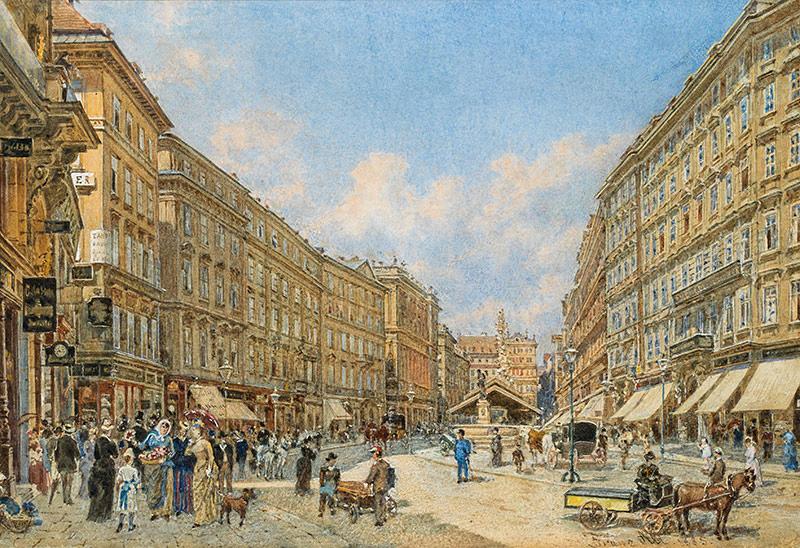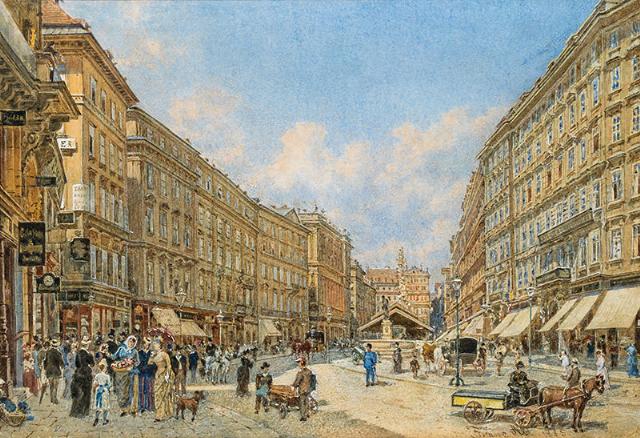



From Wikimedia Commons: Der Graben in Wien gegen den Kohlmarkt (Franz Alt, 1885)
Stefan Zweig’s tragic end resonated perfectly with the despair that he felt about the fate of Europe and civilized customs. A renowned Austrian-Jewish author of short stories and historical biographies, he had a large international audience during the interwar period. His elegant prose and psychological depth captured the fading world of the Austro-Hungarian Empire whose special blend of petty-bourgeois rigidity and scientific ingenuity he revered like childhood memories. As emotions prompted by the decline of Western civilization, challenged from within by barbarians, Zweig’s grief and despair in exile are as relevant today as they were 85 years ago. Unfortunately.
In 1934, Zweig, like other intellectuals and Jews before and after him, was exiled by the rise of Nazism. He first emigrated to England, then to the United States, and finally to Brazil. Although at a safe distance from the horrors of war, he was unable to escape a deep melancholia and sense of cultural and spiritual loss. To begin with, he had witnessed the political-moral destruction of Europe in disbelief. However, once he had fled the Nazis, his perplexity turned into certainty about the end of yesterday’s world; he no longer believed that reason, art or humanity could triumph over barbarism.
In 1942, while living in Petrópolis, Brazil, Zweig and his second wife Charlotte Altmann died by suicide, overdosing on barbiturates. In a farewell letter, Zweig expressed gratitude to Brazil for its hospitality but added:
I think it better to conclude in good time and in erect bearing a life in which intellectual labor meant the purest joy and personal freedom the highest good on Earth.
Zweig’s suicide amounted to more than a personal tragedy — it was emblematic. It reflected a wider intellectual and emotional despair felt by many exiled European artists and thinkers who watched their world unravel. His death remains an indelible testament to what happens when a civilization built on humanism and reason collapses into extremism and violence. This is true even in the absence of open warfare on the battlefield.
For over a hundred years, Europe has been suffering from an identity crisis. Since the apocalyptic carnage of WWI, it has been seized by a profound melancholia — haunted by the collapse of handed-down certainties and unable to believe in its own worth or right to endure. This spiritual exhaustion, born of disillusionment with liberal ideals and the failure of the Enlightenment promise, left a vacuum filled by totalitarian ideologies. As revolutionary movements capitalizing on discontent, Nazism and Bolshevism behaved like predators. Attracted by weakness, they were dark reflections of a traumatized Europe that had lost faith in itself and sought meaning, if not self-forgetting (dissociation), in sado-masochistic extremes.
With reason, progress, and the inherent value of Western civilization shaken to the core, ancient symbols of continuity and tradition, especially those rooted in classical antiquity, were called into question. Monumental architecture inspired by temples, once the embodiment of order, harmony, and permanence, gave way to modernism — another movement that intentionally distanced itself from the past. In place of ornament and proportion, modernism embraced abstraction, functionality, and brutal simplicity.
Importantly, the paradigm shift went beyond the aesthetic; it was existential. Everything that had once anchored European culture — from its Greco-Roman heritage to its Christian moral framework — was uprooted. Yesterday’s ideals were suspected of being complicit in the civilizational collapse. What emerged was a restless search for meaning in a world stripped of its former narratives.
Facing a complex crisis of identity, security, and values, Europe — and Western civilization in general — stand at a critical crossroads in the 21st century. Thus, mimicking the pressure of fascism on democratic governments in the 1930s, challenges are piling up on the geopolitical agenda: (a) violent conflict in Eastern Europe, (b) Islamic-driven terrorization of remaining Christians in the Middle East, (c) rising Chinese imperialism in Asia, (d) Islamic mass migration reshaping societies beyond recognition in Western Europe, and (e) an alarming decline in democratic institutions coupled with growing restrictions on free speech. These issues, though diverse in nature, collectively threaten the international rules-based world order.
At the heart of Europe’s immediate crisis, reviving memories of the darkest chapters in its history, is the Russo-Ukrainian War. In addition to a territorial dispute, the Russian invasion represents a direct assault on the principles of national sovereignty and international law that the post-WWII order was painstakingly designed to uphold. The war has unleashed immense human suffering, displaced millions, and brought Europe face-to-face with the harsh realities of modern warfare on its own soil. Transcending a regional conflict, it tests the unity and resilience of Western alliances like NATO and the European Union, while equally uncovering vulnerabilities in energy dependence and defense readiness.
Simultaneously, beyond Europe’s immediate borders, the ongoing persecution — and unrepentant extermination — of Christian minorities in the Middle East presents a moral and cultural crisis. These communities, some of the oldest continuous Christian presences in the world, are vanishing under the pressures of war, religious extremism, and political instability. Their destruction is not only a humanitarian tragedy but also signifies a loss to the pluralistic heritage integral to Western civilization. The failure to protect them reflects a growing inability in the West to project traditional values of religious freedom and human rights beyond its own borders. General ignorance about the actual spread of Christianity before the Islamic conquests, moral relativism, and political cowardice constitute an obstacle to action.
Adding to this international complexity is the rise of Chinese imperialism in Asia. China’s expansive ambitions through military build-up, economic coercion, and strategic projects such as the Belt and Road Initiative signal a new era of geopolitical competition. This assertiveness challenges the Western-led world order and threatens to shift the balance of power in favor of authoritarian models. Europe, traditionally more economically entwined than militarily aligned in Asia, now faces the difficult task of navigating this evolving reality without compromising its own strategic interests and democratic ideals.
Closer to home, Western Europe grapples with the social and political implications of mass migration. Driven by ethnic conflicts, economic hardship, and environmental factors, migration flows have transformed demographic patterns and tested the capacity of European societies to integrate newcomers. While immigration has temporarily provided labor and contributed economically, it has also ignited fears of cultural dilution, social fragmentation, and political radicalization. Unprecedented polarization resulting from Islamic supremacism (including implacable anti-Semitism) and social segregation, with imams positively discouraging integration and assimilation, strains the social fabric, complicates governance, and fuels nationalist and populist movements inclined to reject liberal democratic norms.
This internal fragmentation is compounded by the noticeable decline in democratic institutions and growing pressure on free speech across many Western countries (e.g., legislation on “Islamophobia” in the UK). The very ideals that once defined Western civilization — open debate, pluralism, and respect for individual rights — are under threat from both external authoritarian influences and internal societal pressures. Increasing political polarization, the rise of disinformation, and the curtailment of individual freedom under the guise of combating “hate speech” or “misinformation” reveal a troubling erosion of democratic resilience. This weakening of foundational freedoms undermines society’s ability to confront both the external and internal threats that it faces (a salient point made by Vice President J.D. Vance during the Munich Security Conference, February 14, 2025).
Like in the 1930s, civilized Europe seems weak and hesitant in the face of a “barbarian conspiracy” aiming for hegemony through (self-)destruction. The Russo-Ukrainian War reveals the fragility of peace and the necessity of credible deterrence. The under-reported plight of Middle Eastern Christians emphasizes the urgency of protecting peaceful believers from ethnic cleansing. Chinese assertiveness demands strategic clarity and unity. Mass migration tests social cohesion and cultural confidence. And the erosion of democratic norms threatens to unravel the very principles that have given Western civilization its distinct character.
Meeting these challenges requires a long-term, winning strategy — one that confidently defends sovereignty and human dignity abroad while revitalizing democratic institutions and social cohesion at home. So, unless it confronts its existential crisis with resolve, empathy, and adherence to core principles, Europe is lost, unable to preserve its legacy and shape a stable, just future in an increasingly uncertain world.
“Having learnt our cruel lesson, we see their overhasty optimism as banal in the face of a catastrophe that, with a single blow, cancelled out a thousand years of human effort.” (The World of Yesterday.) — Stefan Zweig on the naive pre-war optimism of his generation.
